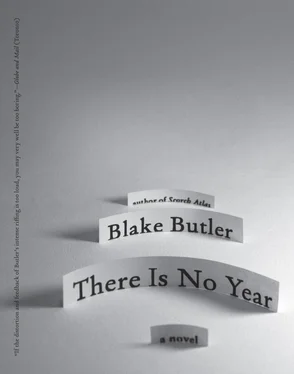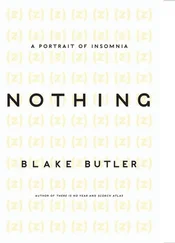They were in another room. There was a sofa, TV, rug, and chairs. Too many chairs. The walls were painted yellow. The room was small and common as any other room ever elsewhere, any room . Up close, the girl’s face looked like his. Her eyes were massive — cracked, bejeweling. The girl stepped back. The girl had boy’s clothes on — the same clothes the son had worn into the house. They clung tight on the girl’s soft body, showing weird tones and ridges in her skin. The son looked and saw now that he was dressed in a white gown, made of lace and ribbon with his full name stitched across the front. The name was written inverted so that he could read it plain by looking down. The gown clung at his throat.
I made that for you, the girl said, sighing. Or had it made. Regardless. Do you like?
The girl was holding a little plastic egg. The egg was made of tiny pieces that folded in or up and out, by which the egg could be modified or disassembled. The girl rummaged through the egg’s configurations absentminded as she watched the son from where she stood against the wall. The egg became a prism, became a thought, became a gun. The girl held it up to show him, near her temple. The egg made little clicking sounds.
The son opened up his mouth. The son was burping bubbles. He felt something crawl inside his throat. He felt his lips go smile and forehead nodding. The son sat up a little. His cheeks were raw. He felt heavy, full of something.
The girl was watching him intently. Are you hungry? Her skin rasped, making noise. The skin rashy, pockmarked, curdling.
The son felt his lips unlock.
The butler fed me, he said, in spouting old voice, then again he could not speak.
What butler? the girl said. What butler?
The man in the kitchen, the son said bending, another guttural gush. A little gray man. Sneezing.
The girl just showed her teeth and winked her eyes.
The girl moved to stand against the wall. She turned and looked at where she was against the wall and moved a little to one side. They were both quiet for some time. The house was quiet. The same air in and around the house.
The girl wasn’t holding the egg anymore, at least not where the son could still see it. The girl was chewing on her lip, and chewing hard. She had a new bulge to her belly. In his own mouth the son swallowed and felt something go down. The son looked across the room. The girl was there. She had something written on her face. She saw the son watching. She pulled out a small white stepladder and climbed up on it and did a dance. Her belly from this angle appeared caving. She grinned and hulked it in and out and out and in.
One of the room’s white walls began to shake.
So what do you want to do now? the girl said, bubbling above the sound.

The father opened up his eyes. What he’d made in the wall where he’d located the unwanted indentation was like a puckering, a way out or way in. The father punched the center of the shape with his fist and listened as it fell into the hole. Then the wall was open. The father put his head inside and peered around.
Inside, the space was roughly large enough for an average-sized adult. There wasn’t enough light to see much else. The father pulled his head back out and took the hammer and began to jack at the opening with the butt-end, ripping away chunks of sheetrock in showers. The head of the hammer, cold. The hole began to widen, its pucker yawned. The father dropped the hammer and pulled at the flaky edges instead with his whole hands, dust falling on the carpet, on his shoes and in his hair. He flung the pieces behind him, yanking and sweating, ticked up in some kind of bizarre joy. He could feel the particles in his nostrils, down his throat — bits of the house.
On the stubborn pieces, hung with nails, he pulled harder, at one point ripping a long cut down his forearm. His bright blood dripped in neon light. The color wept into the fiber, and the wood beneath, another layer. The father didn’t stop. His heart throbbed now more than he could last remember. He felt good. His head was light.
He picked the hammer up again and set it down again. The room spun around the father as if on an axis, some translucent wheel. And the music. He heard music somewhere — inside him — a song he knew he knew he knew. So much music, the father thought. He touched the wall.
The father laughed.
On the floor above the father, the mother had risen up. The mother knew she needed something but could not think of what or how to name it, how to put her hands in a way that would bring that something closer or quell the ache. The mother did not realize she was naked. The parents’ bed had moved. The parents’ bed sat against the wall opposite from where it’d been last. Their sheets were wet and upside-down. The designs on the sheets — same as those in the son’s room, and the guest room, and elsewhere in the house — showed backward through the fabric, becoming something.
The mother moved beyond the bed. She went into the bathroom where the sink and bathtub overflowed. The floor was slick with wet from both. The water had not touched the bedroom carpet. The mother stepped into the water. She did not see anyone in the room. She did not see the father or the son or the other father. The mother walked back out into the hall.
The mother went down the hall to the door to the son’s bedroom and put her hand against the door. She beat the shape and knocked and called his name out. Name! Name! she said, croaking. Son! Son! She shook. The door would not come open. Her wet feet had not left a trail behind her on the carpet.
The mother put the lock against her eye. Through the lock she could see nothing. She took her eye away. She replaced the place where her eye had been with her mouth and blew through the keyhole into the door. The mother had learned this trick. Her breath was made of air and water, laced with house dust. The mother touched the knob again. The door came open. Inside the son’s room as well the bed had moved from one wall to another — through the wall the parents’ and the son’s beds had come to kiss. The wall seemed to bow slightly between them. There was a sound but not a sound.
On the floor, bunched on the carpet, the mother saw a box. The box was neat and had black coating. The box did not have seams. The mother moved. The windows rattled. Her cell phone rang. She could not hear it. She could not hear. Her neck muscles pinched, contracting. Her right thigh began to spasm. The mother stood above the box. She nudged it with her foot. The box didn’t move much. In the grass below the window something thrashed or rattled. The mother squatted on her popping haunches. Her nails and hair were getting longer. The box rotated. Her eyes burst vessels. There was a sound but not a sound. Around the house the trees were bending. The mother took the box and made it shake.
THE HOUSE WAS GETTING WAVY
What was that? the son said, slurring. What is it?
He tried to hide behind his hands. His mouth filled with a thin, translucent goo.
The girl kept looking at him.
The son could not blink.
Just past the short, brushed shaft he had uncovered behind the wall there, the father found another house. An exact copy of their own house — a copy kitchen, den and bedrooms, and so on. The replica connected in mirror to the air where during the day they ate and night they slept. The copy house had the same furniture and junk as the other — same pictures, carpet patterns, rub marks, dishes in the sink — though here their personal adornments, family items had turned a smoke-licked shade of black. Black bulbs, black quilts, black clothing — black food cartons, utensils, mail. Only the doors, floors, and walls — the body of the house itself — remained the same as in the other, if made paler by their darker contents in relief.
Читать дальше













